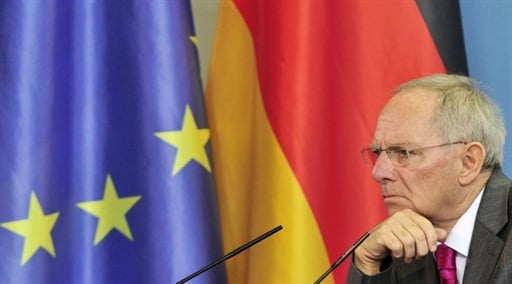
Wednesday, November 23, 2011, Germany sold 10-year Bunds at its debt auction worth 3.64 billion euro with an average yield of 1.98%, and the bid-to-cover ratio was 1.1 , while the Bundesbank retained the remainder of the 6 billion euro offering. To most people, that’s just Wall Street gobbledegook, but in fact, it is a very important statement. Translated into something resembling English, it means the fixed-income investors are starting to lose their faith in Germany. When the bond market vigilantes took on Greece and Ireland, Portugal and Italy, the Germans lectured the spendthrift Mediterraneans about fiscal rectitude. Now, though, it seems that Germany is starting to suffer as well.
Imagine for a moment a new car model comes out and the manufacturer sells less that 60% of the cars it made – that would be a disaster by any standard. The same thing happened with these new German bonds (called “Bunds” to distinguish them from UK Gilts or American T-bonds). Germany wanted to sell 6 billion euro of debt, but there were only bids for 3.64 billion, which is why the Buba, as financiers often refer to the German central bank, retained the rest. This is usually termed a “failed auction.” Danske Bank described it as “the worst on record.” Marc Ostwald, chief economist at Monument Securities in London told Reuters the auction was “a complete and utter disaster.”
“It couldn’t have been much worse. We’ve seen failed auctions before, but the scale of failure of this auction is of a different order,” Mr. Ostwald later told CNBC.com. It is also of a different quality – who would have imagined that the biggest failed debt auction in Europe since the euro crisis began would be a German one? Germany as a safe haven is an idea under siege.
Achilleas Georgolopoulos, strategist at Lloyds Bank in London, told Reuters, “Bunds are starting to lose their appeal because markets have to believe the euro bonds story and Germany is very close to starting, essentially, to guarantee the debt of other countries.”
And he’s right. The Buba essentially did what Angela Merkel has, so far, refused to let the European Central Bank do – monetize the debt, or more colloquially, turn on the printing presses. France’s Les Echos explained (translated by a pal of mine) “The ‘Finanzagentur’, who is in charge of the German debt, wanted to put 6 billion of a new strain 10-year bond, and has managed to sell 3.64 billion euros of securities to investors. The rest was taken by the Bundesbank, the German central bank, which will it on the secondary market. ‘The Buba took 39% of the auction is an entirely new level,’ said Cyril Regnat at Natixis. ‘Ironically, Germany, which is opposed to the European Central Bank (ECB) purchases sovereign debt, calls on its national central bank to ‘save’ the auctions of debt when investors do not turn up’.”
Cullen Roche over at Pragmatic Capitalism (pragcap.com) wrote, “What will the other national central banks make of this? And better yet, what will they do about it? If Germany is seen as being in direct violation of the Maastricht Treaty then the entire charade becomes a violation of such magnitude that all nations involved have to begin wondering why they’re abiding by the German austerity plan while also adhering to the German rule of no ECB engagement in periphery bond markets?”
When the bond market vigilantes come after your neighbors, it’s sad for the neighbors, but when they come after you, your safe-haven status and your Aaa credit rating, it’s a horse of a different color. I have long believed that eventually Germany would have to cover agree to cosign the loans made to the other eurozone members. With its own debt coming into question, it may have to do so sooner rather than later. It can’t afford to do anything else.